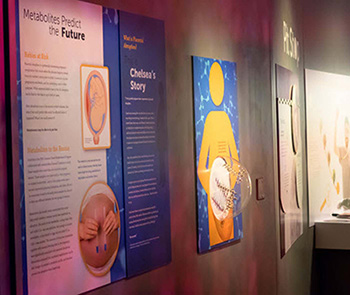RTI International designs metabolomics module at NC Museum of Natural Sciences Exhibit

RESEARCH TRIANGLE PARK, NC — "The Secret World Inside You" now open at the North Carolina Museum of Natural Sciences uses larger-than-life models, computer interactives, videos and art installations to explore the rapidly evolving science that is revolutionizing how we view human health and understand the inner workings of the body.
In partnership with staff at the NC Museum of Sciences, RTI International scientists led by Susan Sumner, Ph.D., and funded by the NIH Common Fund Eastern Regional Comprehensive Metabolomics Resource Core designed the metabolomics module that is part of the exhibition. RTI also contributed $25,000 to the exhibit.
"Meet your Metabolites" describes how the study of metabolomics can be used to determine a person’s health and diagnose certain diseases. Doctors may also soon be able to use metabolomics to personalize nutritional supplements or suggest medical treatments.
The module describes research by the National Institutes of Health Common Fund Eastern Regional Metabolites Resource Core to develop and apply metabolomics to reveal biomarkers and gain mechanistic insights into disease.
Researchers in the NIH Common Fund Metabolomics Program at RTI also contributed to the content of the "Super Human" interactive exhibit that uses projection mapping technology to animate a human figure who tells a story about the connections between microbes, metabolites and our health. The content of the exhibit was based on research by scientists in the Metabolomics Program, including one study in partnership with the NC Museum of Sciences to analyze metabolites in sweat from people participating in a community science project.
The microbes in and on the body are more numerous than the stars in the Milky Way. Microbes — the term used for organisms that are too small to be seen with the naked eye — have often been seen simply as "germs" that cause disease. Yet contrary to this common misconception, most microbes that live in the body are vital to keeping the digestive system, immune system and brain working properly.
Investigating the human microbiome is a young science, and researchers are just beginning to understand what constitutes a "normal" microbiome, how it changes over time, and how it affects health and disease. But what is clear is that the effects of the microbiome on its human host are profound and multifaceted — and could play an important role in common health problems like allergies, asthma, obesity and even anxiety and depression.
The exhibition is organized by the American Museum of Natural History, New York. This exhibition is sponsored by UNC REX Healthcare and presented in partnership with the NC State College of Sciences, with additional support from RTI. The exhibit runs through March 12, 2017.